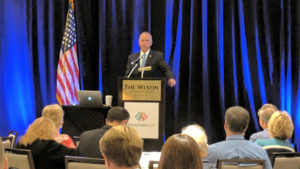Senator Thom Tillis Says eVerify, Border Security Key to Successful Immigration Reform

Senator Thom Tillis (R-NC) addressed members who attended AmericanHort’s Impact Washington legislative fly-in .
On Sept. 25, Senator Thom Tillis (R-NC) introduced legislation for the SUCCEED Act, a co-sponsored solution with Senator James Lankford (R-OK), to the plight of the children affected by President Trump’s decision to phase out and eventually end Deferred Action for Childhood Arrivals (DACA) over the next two and half years. Tillis filed the bill for the act one day after opening AmericanHort’s Impact Washington legislative fly-in, where he detailed his deal breakers on immigration reform for horticulture industry members, one of which was that there needed to be an immediate, compassionate, conservative fix for those affected by DACA, as the first step in a broader border security effort.
Tillis Working Toward Better Policy for Businesses
Senator Thom Tillis (R-NC), became familiar with the green industry as a resident of Huntersville, NC. As a nearby town commissioner turned state representative, Tillis helped the Van Wingerden family, owners of Huntersville, NC-based Metrolina Greenhouses, to petition to change building codes in order to help the business expand. Without his help, those issues may have otherwise caused Metrolina to leave the state, Tillis said during his talk.
“The codes made sense for other businesses, like hotels, but they didn’t make sense for greenhouses,” he said.
Tillis served as North Carolina Speaker of the House from 2011 to 2014, in which he was instrumental in enacting job-creating policies and reforming the state’s tax and regulatory codes before running for the U.S. Senate.
“I’ve tried to bring to Washington what we have in North Carolina, and right size business impact so people can be competitive,” he said. “I came from a small, clean business – how can we be a small, clean government?”
Today, Sen. Tillis, a member of the U.S. Senate Agriculture Committee, is currently working to pursue policies that remove excessive regulatory burdens and roadblocks. According to AmericanHort President and CEO Ken Fisher, Tillis “is the leading voice in the Senate for finding sensible ways to resolve the critical labor issues impacting the green industry, including H-2B seasonal visas.”
Introduced by Dennis Niemeyer with Carlton Plants, based in Saluda, NC, who said Tillis is a leader on several issues but especially immigration reform, the senator said the “punch list” for this Congress include immigration and guestworker policies to solve critical labor needs for industries like agriculture; reasonable tax reform that makes sense for businesses; healthcare; and improved infrastructure, which will create opportunities for several industries, including horticulture. Tillis said he feels confident that all of these issues will be addressed over the next 18 months, though it will take time and patience to make long-term progress, especially on immigration reform.
Data-Driven, Consistent Approach Critical to Immigration Reform, Tillis Says
As one of the leaders in the Senate focused on immigration reform, Tillis said he has been working to explain to his colleagues that the current labor shortage isn’t about paying higher wages because that only gets employers so far when there are just not enough American workers available or willing to fill certain jobs.
“We need to get to the point that we have a data driven, consistent approach to figuring out what our labor inputs are, whether or not we have American workers who can fill those jobs, and fill those jobs. It doesn’t need an arbitrary cap that we set. There needs to be some methodology behind it.”
He said it’s reasonable to expect that with enough focus, the problems surrounding immigration reform can be resolved over the next three to four years, but “it’s going to take time, patience, and someone like me who is willing to spend every ounce of political capital I have at the expense of losing my next election to solve problems that seem unsolvable.”
As a former management consultant used to developing methodologies through structured thinking and analytics, Tillis said when he became a senator he wanted to develop a methodology for passing immigration reform by studying why the comprehensive bills of the past have failed, and then look at how different elements of immigration reform can be broken into pieces and paired into transactional coalitions for broader bipartisan buy-in and passage.
“What we’ll find is the reason comprehensive immigration reform fails is that the sugar coating around certain provision erodes to the point that people won’t support it and it will fall a few votes shy when you put it all together. [Instead] you have to look at how you pair things that give you transactional coalitions.”
A good example, he said,is creating a solution for the halted DACA policy and border security, like he and co-sponsor Sen. Lankford have through the recently introduced SUCCEED Act legislation.
“I think a group of people that coalesce around that will be slightly different than the people who coalesce around comprehensive work visa reform or work visas in general,” Tillis said. “So I say let’s look at these things and see how they done in the past so you can build a critical mass of votes. You can get to comprehensive reform, but rather than just one big bill, think about it in terms of four subsets that over the course of a few years you can possibly get done. That’s how you can put your shoulder into it and make progress.”
Here’s how Tillis stands on the issues falling under immigration reform.
DACA, Border Security, and the Wall
“Border security and dreamers have a logical connection – if you want to really solve this problem. If you really care about the children first – then let’s talk about why you should care about border security. You should care about these kids that come across the border who are put in human trafficking, and you should care about the hundreds who have died trying to cross the border. That’s why you want to increase people, technology, and infrastructure, not build a wall. A wall never made sense. You need it in some places, and that’s part of the infrastructure, but you need intelligence, surveillance, reconnaissance, you need more people on the ground, more capabilities that don’t involve some monolithic structure you can see from outer space. We need to spend a little more time on the humanitarian case for border security, and stipulate if the President wants a wall, he needs a different Congress because he’s not going to get it with this one. If he wants a secure border, he can get it. I’m glad he’s standing firm on a secure border and a secure homeland. Let’s figure out the how, based on what the border security and military experts are telling us we need, who put their lives at risk at the border every day.”
eVerify
North Carolina is one of the states that has passed use of eVerify, though the effort had to be fixed initially to include a provision for agricultural guestworkers. Tillis said he wants to put “everything on the table” to see what works for businesses, and that includes eVerify, and he is willing to spearhead discussions with the states that are using it to see what’s working and where the holes are. But ultimately, he said he views eVerify as a mandatory part of work visa reform.
“If you are for reform, you’re going to do visa reform, and you have to be prepared for eVerify to be somewhere in that mix,” he said. “I do believe that eVerify as part of visa reform makes total sense. It’s highly unlikely that I would support any kind of visa reform that didn’t have eVerify as a component.
“We have to have this pairing where I’m going to be more liberal on exactly how we do the work visas and how many we provide, but we need to rain down hell on any employer that doesn’t comply with the system going forward. It’s the only way you can get a level playing field for all businesses to operate, and it’s the only way you get the kind of numbers to have unlikely bed fellows come together and vote on reform bills.”
H-2A and H-2B Guestworker Visas
“I have talked about this with [Sen. Dianne] Feinstein and others on importance H-2A. Knowing that the estimates are as many as 50% of those working in agriculture and ag-related fields are illegally present, it’s hard for me to imagine that, if that number is anywhere close to being true, that you don’t need H-2A inputs for the industry to be successful. The question is how do you get those folks to a position where they are part of the workforce, either as H-2A or another status yet to be defined. But you need [guestworkers] when you need them, and you need more certainty in both programs and resources at federal level to process them in expeditious ways.”
“What I mean by data driven approach – we need some way to reasonably estimate how many people we’re going to need over a year or two-year period and also the resources to get things done in the time period that’s not disruptive to the industries they serve. That’s got to be part of visa reform. And there are many in the current administration who agree.”
“If you think H-2A is hard, try dealing with H-2B. I have to do it every year, and had to do it this year to get the Department of Labor and Homeland Security to get the extra 15,000 visas issued. I had a discussion then with [Homeland Security Secretary] Kelly – who didn’t want to place them – and I said, ‘We have people whose seasons are on the line and we need these workers. Right now, I’m not taking an arbitrary decision because my employers need these workers. So [if that’s your answer, then] I decided to make an arbitrary decision that Homeland Security doesn’t need its workers and I’m not going to allow any kind of confirmation to go through the Senate until I get some clarity on this [H-2B] bill. No hard feelings but my arbitrary decision to [hold up Homeland Security workers] is no different than the arbitrary decision you’re making to hold up visa workers.’ We made a little progress after that.”










